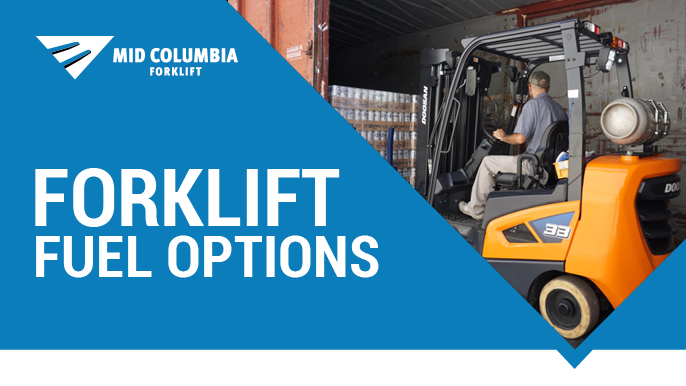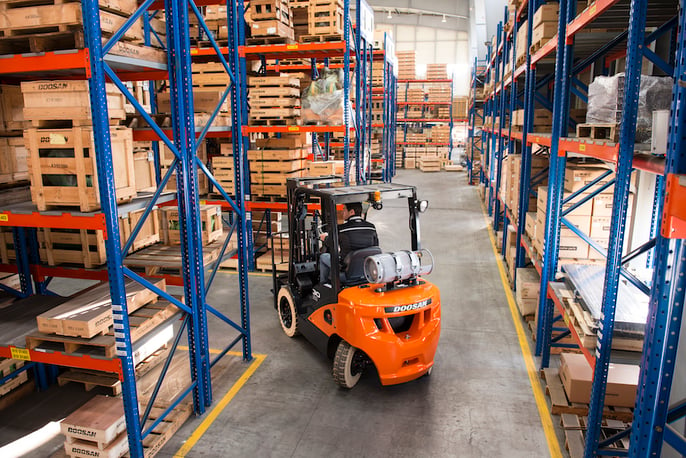Fuel Options for Internal Combustion (IC) Forklifts
by Trey Barber, on August 27, 2021 at 7:51 AM
 Today's material handling industry relies on forklifts powered by either electric or internal combustion (IC) energy. While electric power is growing in popularity, IC forklifts still dominate outdoors and heavy-duty settings. If you are adding IC forklifts to your fleet, each fuel type offers pros and cons. Here's what you need to know about each fuel option on the market today.
Today's material handling industry relies on forklifts powered by either electric or internal combustion (IC) energy. While electric power is growing in popularity, IC forklifts still dominate outdoors and heavy-duty settings. If you are adding IC forklifts to your fleet, each fuel type offers pros and cons. Here's what you need to know about each fuel option on the market today.
LP Gas
Liquid Petroleum (LP) Gas forklifts are ideal for indoor and outdoor settings. LP Gas (also known as propane or LPG) is a clean, non-toxic gas that is not a danger for workers indoors. It also runs longer than other fuel types and causes less wear and tear on engines over time. LP forklifts make less noise and deliver a steady, reliable performance compared to different fuel types. Swapping out LP tanks is faster and easier than refueling other options. If you choose LP, make sure you have safe areas to store spare LP tanks. Read this post if you're trying to decide if you need a propane forklift or an electric forklift.
Diesel Fuel
Diesel forklifts are mostly used in outdoor settings. These are very fuel-efficient and can run for extended periods. Diesel forklifts are most often used in rough terrain and heavy-duty environments. The high power torque of diesel engines makes them powerful for handling heavy loads. These include ports, lumberyards, forging, and aerospace. Diesel forklifts are not recommended for indoor settings due to their noise levels and other emissions. 
Gasoline
Gasoline forklifts are not widely used. This is because gasoline fill stations are not a common feature in material handling settings. However, some dual-fuel forklifts can run on either gasoline or LP gas. The flexibility can help when a load might require more horsepower to move. Gasoline forklifts also have better visibility than LP forklifts since there is not a fuel tank obstructing the operator's view. Gasoline provides consistent power and performance but is quieter and cleaner than diesel forklifts. However, if your facility does not have gasoline filling stations, LP forklifts may be the better choice.
Compressed Natural Gas
Compressed natural gas (CNG) forklifts are an environmentally friendly option. CNG engines have very low emissions and create consistent performance similar to LP forklifts. CNG is also less of a risk for workers. If there is a leak, CNG breaks down to harmless carbon dioxide. They also help reduce the risk for worker injuries since the tanks are fixed on the forklift and are refilled on the site. However, installing CNG refueling stations can be expensive and requires large amounts of space.
Whatever fuel options you are considering, MidCo Material Handling is here to help. Our helpful team can help you understand your IC forklift fuel choices and which models meet your needs. Contact us here or reach out directly to our dealerships by phone:
Auburn 253-854-5438
Pasco 509-547-7413
Wenatchee 509-663-9009
Yakima 509-457-5137
Further Reading:
Pros and Cons of LPG Forklifts
Electric Vs. Propane Forklifts - Which is Best?
Forklift Trade-In Guide: How to Maximize the Value of Your Forklift Trade-in




